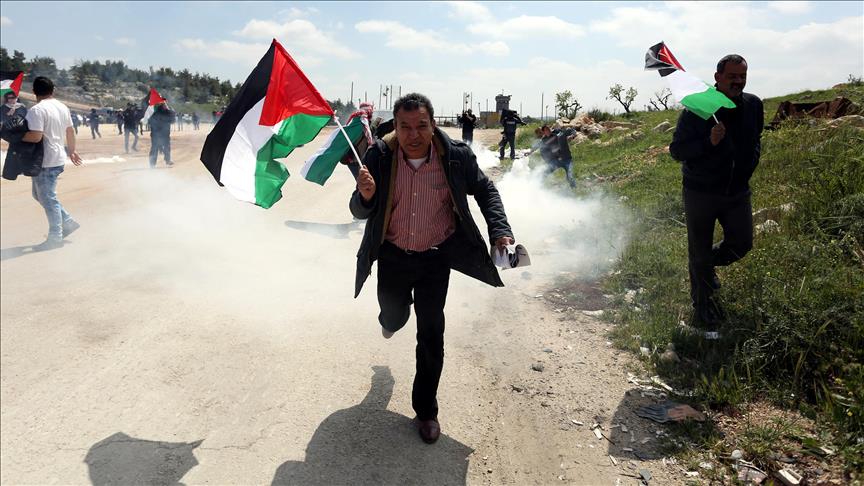Palestinian 'wave of anger' fades without direction
Individual attacks overshadowed protests as Palestinian leadership failed to direct anger, say analysts

Quds
By Kaamil Ahmed
JERUSALEM
An outburst of unorganized violence that broke out six months ago was the product of political stagnation and is unlikely to have benefits for Palestinians, according to analysts.
At least 202 Palestinians have been killed since Oct. 1, mostly after alleged individual knife or car-ramming attacks, which have killed 33 Israelis or foreigners.
While the likes of the Gaza-based Hamas movement quickly claimed the events signaled a third intifada – to follow the movements of the late 1980s and early 2000s – the protests have since faded because of a lack of political direction, according to Alaa Tartir, program director at the Palestinian al-Shabaka think tank.
"The last six months showed how weak the Palestinian political parties are. This wave of anger is not really owned or steered by the political parties," said Tartir. "If you look at the level of clashes in October and November, they were considerably higher than they were in February and March."
"You need popular support and a popular uprising on the street in order to witness a collective social movement," he added.
Tartir said the intensity of individual attacks grew as the protests dwindled in the absence of political support and sweeping arrests by Israeli forces across the occupied West Bank and East Jerusalem.
Israeli Prime Minister Benjamin Netanyahu noted Sunday that the number of attacks had also declined in recent weeks, which he attributed to a "strong" response by Israeli forces.
A report presented by the Shin Bet intelligence agency to the Israeli cabinet said there were 20 alleged attacks in March compared to 78 in October because of "effective deterrent measures to prevent additional attacks and determined action against Palestinian incitement."
The report also suggested that most of the alleged attackers were young and driven by personal or economic issues rather than nationalistic motives.
Amos Harel, defense analyst for Israeli newspaper Haaretz, wrote Monday that while Netanyahu deserved credit for the decline in violence, the Israeli premier had neglected to mention the role played by the Palestinian Authority (PA).
"He is probably also deserving of the credit he so generously bestowed on himself for the tough approach toward the Palestinian terror," wrote Harel. "That same PA, which Netanyahu repeatedly accused of incitement in the initial period of this round of violence, is now responsible for a systematic campaign of arresting terror suspects and for conducting an information and deterrence campaign in West Bank schools."
Support for knife attacks has significantly dropped amongst Palestinians, according to the latest monthly poll by the Palestinian Center for Policy and Survey, which found support had dropped to 44 percent in the occupied West Bank compared to 57 percent in December.
Since October, the Israeli cabinet has passed a raft of new security measures, including giving soldiers the ability to use live fire in clashes with stone-throwing protesters, increased scope for searches, increased home demolitions for the families of alleged attackers and withholding the bodies of alleged attackers killed by Israeli forces.
"The Israeli harsh response is unprecedented. They now opted to go for shoot-to-kill as a means of deterrence and as a way of deepening the sense of loss among the Palestinians and the sense of defeat," said Zakaria al-Qaq, national security expert at al-Quds University.
He said the attacks were always unpredictable because they were isolated and that, while Israel's measures appear to have initially created a deterrence against attacks, they were likely to build resentment in the future.
According to al-Qaq, October's outburst was a combination of Palestinians fearing a threat against Al-Aqsa Mosque – which was closed to men under 50 for much of September and October – and feeling abandoned by the Palestinian political class.
He said that while the Gaza-based Hamas movement had become more politically-muted, the hope for an alternative political party had faded after former Prime Minister Salam Fayyad failed to offer an alternative to President Mahmoud Abbas and the PA.
"The entire 'third party' is gone. People feel they were again deceived by the independents, not Hamas or Fatah. They lost interest in all of the parties," said al-Qaq.
Since January there has been an increasing focus on renewing suspended peace talks, especially in the form of a French push for an international conference on the issue.
While Israel had initially offered a tepid response to France's suggestions, in recent weeks, both Netanyahu and Abbas have spoken more openly about resuming talks, albeit while claiming they were waiting on each other to initiate the process.
According to Tartir, negotiations are both likely and predictable, following the cycle of previous similar outbreaks of violence, but are unlikely to produce any resolutions to the conflict.
"It seems once again the sacrifices of the Palestinian people will be lost," said Tartir.
Anadolu Agency website contains only a portion of the news stories offered to subscribers in the AA News Broadcasting System (HAS), and in summarized form. Please contact us for subscription options.







